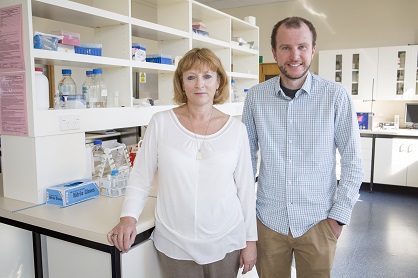
Chair in pharmaceutical sciences, Sarah Hook, and senior lecturer Dr Allan Gamble, have received research funding to modify cancer drugs so they have less side effects. (Photo credit: Rewa Pene).
Ideally, the research will result in cancer-fighting drugs with less side-effects which will enable higher drug concentrations to be tolerated.
Turning weapons of mass destruction into precision-guided munitions sounds like something out of a sci fi movie, but it's all in a day's work for Sarah Hook and Allan Gamble.
The pair recently received $34,960 from the Lottery Grants Board to trial modifying cancer drugs so they have less side effects.
Their research project is titled: Turning weapons of mass destruction into precision-guided munitions.
Professor Hook, the University of Otago's Chair in Pharmaceutical Sciences explains she and Dr Gamble, a senior lecturer at the school, hope to achieve this by turning current cancer drugs into inactive and nontoxic prodrugs, which are only activated once they reach a tumour.
There are a number of drugs for treating cancer that have been around for a long time, which are good at killing cancer cells, Professor Hook says.But they also kill other cells, which results in unpleasant side effects such as nausea, hair loss and gastric problems which many people suffer.
Ideally, the research will result in cancer-fighting drugs with less side-effects which will enable higher drug concentrations to be tolerated.This will increase the drugs' efficacy, while making them more tolerable for patients.
The researchers are synthesising a number of novel chemotherapy prodrugs and tumour-responsive nanoparticles and now need to investigate the potential for these therapies to kill tumour cells in a laboratory setting in-vivo.
Two PhD students, Arnold Lee and Sumit Dadhwal have been doing a lot of work in this area, together with Dr Gamble and Professor Hook, developing formulations to get through to this stage.
“We've got some really nice formulations there and it's going to be great to get into the pre-clinical lab setting,” Professor Hook says.
Currently, there are no prodrugs commercially available which activate only the tumour site.
Nationally, about $3.5 million was distributed in the recent Lottery Health Research funding round.University of Otago researchers gained more than $2.6 million of that funding to support studies aimed at improving the health status of New Zealanders.
Article written by Liane Topham-Kindley, for Pharmacy Today, May 2017
